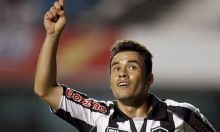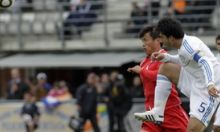The Superclásico, one of the largest soccer derbies in the world, will take place on Sunday between River Plate and Boca Juniors, the two biggest teams in Argentina, bringing Buenos Aires to a complete stop. The formidable El Monumental Stadium in River will serve as the arena for this confrontation between the ferocious rivals (their 293rd encounter).
The adversaries this time around are in the midst of very different seasons, which adds a little variation to the Superclásico. With 23 points after 10 games in the Apertura Championship, Boca is in the first place, 10 points ahead of River, which is stuck in last place. Making matters even worse for River, the Brazilian squad Corinthians, led by former Boca hero Carlos Tevez, just knocked River from the Copa Sudamericana competition. Cerro Porteno, the Paraguayan champions, were routed by Boca Juniors 5-1 as they advanced to the semifinals with a commanding 7-3 aggregate victory.
The Fans
It’s always intriguing to consider the social variety of the fans of the opposing teams. The majority of Buenos Aires’ elite are River Plate supporters. This is partial because Monumental Stadium is situated in the upscale Nuez district, thus the club’s moniker, the Millonarios. Given that the team’s Bombonera stadium is situated in the city’s bohemian La Boca neighborhood, Boca’s fan base is frequently thought to consist of working-class individuals. In actuality, the Italian immigrants who founded the squad in 1905 are the source of the team’s moniker, Los Xeneizes (literally, the Genovese).
Club accomplishments
Both teams have a long history in both South American soccer and international sports. Since 1931, they have together won more than 50 league titles, which is the bulk of all titles won by Argentine teams.
Boca has a very large collection of medals: It has won five South American championships (1977, ’78, ’00, ’01, and ’03), and its most recent Copa Libertadores victory, a 5-1 aggregate thrashing of Santos of Brazil, came under former manager Carlos Bianchi. Santos was a well-known team that featured international stars like Robinho, Diego, and Ricardo Oliveira. The Xeneizes have also won three times in the European/South American tournament known as the Intercontinental Cup, or FIFA Club World Championship. They only recently expanded their collection with the Copa Sudamericana.
Even while River Plate’s trophy collection may not be as big, it still holds several championships that make it the envy of many other clubs across the globe. Two Copa Libertadores (’86, ’96), an Intercontinental Cup, a Super Cup, and a Copa Interamericana are among River’s accomplishments abroad (now defunct).
Head-To-Head
The clubs have extremely tight histories against one another. In their 177 league games against each other, Boca has 66 victories to River’s 59. (there have been 52 draws). River and Boca have faced off 292 times, including cup games and other matches, with Boca winning 112, River 92, and 88 draws.
More recently, the host team has won each of the previous four Superclásicos dating back to Boca’s triumph in the 2004 Clausura. In their most recent encounter, which took place at the Bombonera at the end of May 2005 for the Clausura Championship, Boca prevailed 2-1. (Like many Latin American leagues, the Argentine season is split into an Aperatura, or opening half, and a Clausura, or closing.)
Squads
Many people consider the Boca team led by manager Alfio Basile to be the finest Xeneizes squad in recent memory. To reduce the likelihood of a repetition of Boca’s forgettable first half of the year, when it struggled in both the league and the Copa Libertadores, club president Mauricio Macri made significant off-season purchases. Since Basile assumed leadership after the previous campaign, the team has acquired several of Argentina’s top domestic stars, including Federico Insa, Daniel Bilos, Juan Krupoviesa, Daniel Dáz, and Guillermo Marino, as well as drawn Sebastián Battaglia and Hugo Ibarra, who were both playing in Spain.
Talented defenders Jose Calvo and Rolando Schiavi, midfielders Fernando Gago and Neri Cardozo, and strikers Martin Palermo and Rodrigo Palacio round out Boca’s roster. Guillermo Barros Schelotto and Marcelo Delgado are effective weapons off the bench. With Roberto Abbondanzieri, Argentina’s No. 1 goalkeeper, guarding the net, Boca can likewise feel confident between the posts.
Former coach Leonardo Astrada resigned after River’s disastrous start to the Apertura, and replacement manager Reinaldo Merlo hasn’t been able to lead the team to the success that River supporters have been accustomed to.
When the Clausura was over, team president Jose Maria Aguilar sold the majority of the roster, including well-known players Javier Mascherano, Luis Gonzalez, Marcelo Salas, Jose Sand, and Carlos Diogo. This is one of the reasons Astrada departed. Numerous new players, notably Andrés San Martn, Jonathan Santana, Gabriel Loeschbor, Diego Galván, and bright prospect Gustavo Oberman, are part of the new Millonarios side.
Although its team doesn’t appear to be as powerful on paper, River’s new strategy relies on developing potential from the young levels rather than relying on existing players. Despite this, the team will do all it takes to defeat its fierce opponents. Playmaker Marcelo Gallardo and attacker Ernesto Faras, both of whom have been performing below their potential this season, are additional players that might make a difference.
Current Events
After defeating Tiro Federal 2-1 last week to earn its fifth straight league victory, Boca enters the derby in excellent form. The same cannot be true for River, who fell to Olimpo of Bahia Blanca 2-1 for its fifth defeat in as many Aperatura games. Although Boca is the favorite to win and get three points, don’t rule out the Millonarios, who will make an effort to break their losing streak against their bitter rivals with the support of their devoted supporters.







